
[ad_1]

Halyna Zahorodnikh, 71, stands in her kitchen that, like a lot of her condominium, has sustained harm from close by shelling. Plastic sheets now hold the place the home windows have been. She is certainly one of tens of millions of Ukrainians dealing with a winter that is primarily being weaponized towards them.
Claire Harbage/NPR
conceal caption
toggle caption
Claire Harbage/NPR

Halyna Zahorodnikh, 71, stands in her kitchen that, like a lot of her condominium, has sustained harm from close by shelling. Plastic sheets now hold the place the home windows have been. She is certainly one of tens of millions of Ukrainians dealing with a winter that is primarily being weaponized towards them.
Claire Harbage/NPR
IZIUM, Ukraine — The gasoline line was punctured by shrapnel. Plastic sheets now hold the place the home windows have been. A single electrical warmth lamp is all there may be to maintain the house from freezing.
Halyna Zahorodnikh, who’s 71, wears layers of fleece within the condominium to remain heat.
She is certainly one of tens of millions of Ukrainians dealing with a winter that is primarily being weaponized towards them.
Russia’s systematic and repeated assaults on Ukraine’s power and heating infrastructure — the newest of which concerned the heaviest missile strikes in a virtually nine-month conflict — have led to common energy outages in a few of the nation’s largest cities.
In smaller cities like Izium, the place Zahorodnikh has lived all her life, electrical energy is intermittent and continually threatened by the kind of long-range missile and drone strikes which have turn out to be widespread during the last two months of Russia’s conflict on Ukraine.

An entrance to Zahorodnikh’s constructing in September, simply after Ukraine recaptured her city of Izium from Russian forces.
Claire Harbage/NPR
conceal caption
toggle caption
Claire Harbage/NPR

An entrance to Zahorodnikh’s constructing in September, simply after Ukraine recaptured her city of Izium from Russian forces.
Claire Harbage/NPR

Signs of destruction might be seen all through the constructing that Zahorodnikh lives in from simply after Izium was liberated from Russian forces in September.
Claire Harbage/NPR
conceal caption
toggle caption
Claire Harbage/NPR
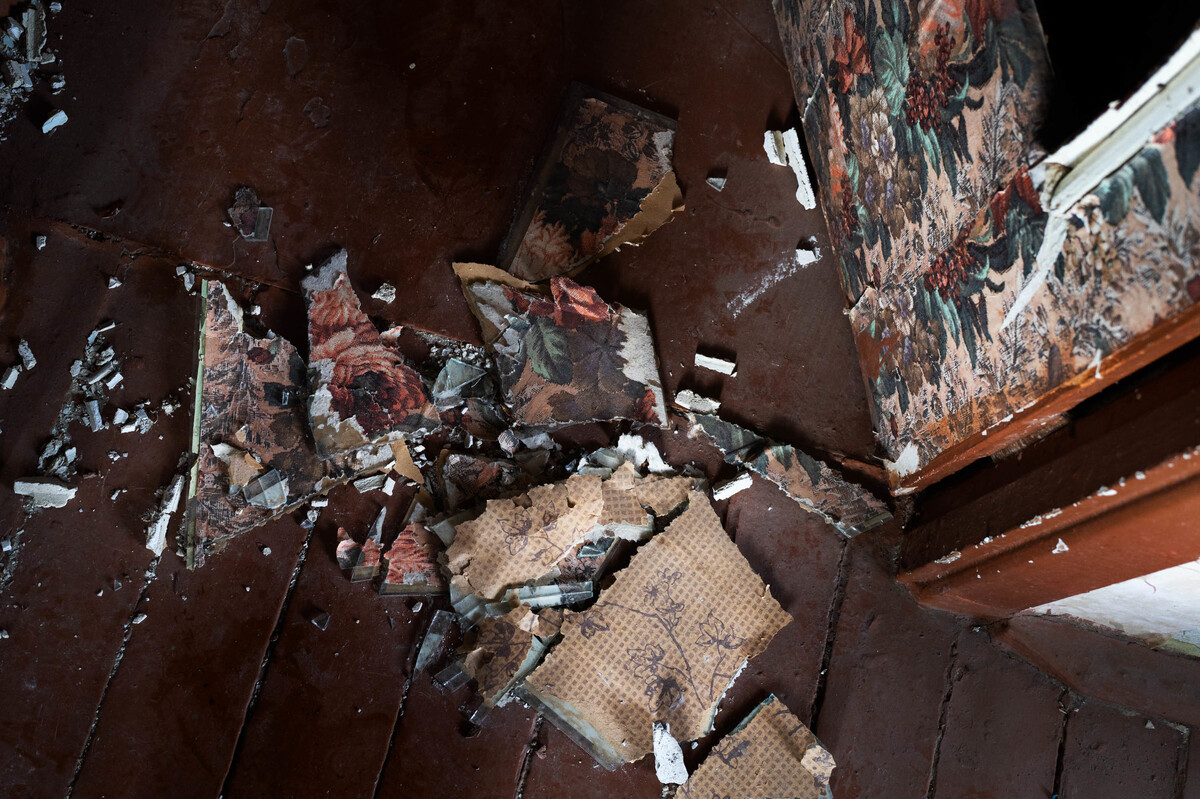
Signs of destruction might be seen all through the constructing that Zahorodnikh lives in from simply after Izium was liberated from Russian forces in September.
Claire Harbage/NPR
Following final week’s widespread assaults, nearly half the nation’s power system has been disabled, Ukrainian Prime Minister Denys Shmyhal mentioned at a meeting with the European Commission Friday. “Russia is trying to compensate for the losses on the battlefield with missile attacks on civilian critical infrastructure,” he mentioned.
Ukraine’s power ministry has been making an attempt to restore broken infrastructure as rapidly as it might.
“Russia tries to destroy all of the energy supply chains. Generating facilities — especially thermal power plants — distribution systems and power lines,” the power ministry mentioned in a written assertion to NPR earlier than the latest assaults.

The International Rescue Committee palms out blankets and different winter gear to individuals in want in Dnipro, Ukraine, in October.
Claire Harbage/NPR
conceal caption
toggle caption
Claire Harbage/NPR

The International Rescue Committee palms out blankets and different winter gear to individuals in want in Dnipro, Ukraine, in October.
Claire Harbage/NPR
The assaults have left residents and companies scrambling for gas-powered mills and firewood. Nonprofit help organizations, the United Nations and Western allies have began to incorporate winter clothes, thick blankets and heating tools in shipments to the nation.
“Should there be large-scale outages for long periods of time, we simply do not have the resources to provide people in need with the assistance they will need,” says Marysia Zapasnik, the International Rescue Committee’s Ukraine director. “The humanitarian situation will become much more dire than it is now.”
The electrical warmth lamp warming Zahorodnikh’s front room was given to her by an help group. Donated blankets line her mattress. She plans to remain for winter.
And if she loses energy?
“I don’t know,” she says, with a cussed smile. “Maybe I’ll burn my books.”

Zahorodnikh stands within the basement of her constructing the place she sheltered whereas Izium was underneath Russian occupation.
Claire Harbage/NPR
conceal caption
toggle caption
Claire Harbage/NPR

Zahorodnikh stands within the basement of her constructing the place she sheltered whereas Izium was underneath Russian occupation.
Claire Harbage/NPR
Russia targets Ukraine’s means to maneuver power
Russia has attacked Ukraine’s heating and electrical infrastructure for the reason that begin of its almost nine-month invasion.
As early as June, Ukraine’s power minister, German Galushchenko, advised NPR that Russia was seeking to weaponize the coming heating season with assaults on power assets and amenities.
Many of Russia’s early strikes, Galushchenko mentioned, have been geared toward energy producing sources — thermal coal and gasoline vegetation. Russia additionally continues to occupy the largest nuclear power plant in Ukraine — and all of Europe — within the nation’s south. Ukraine will get roughly 60% of its power from nuclear energy stations.
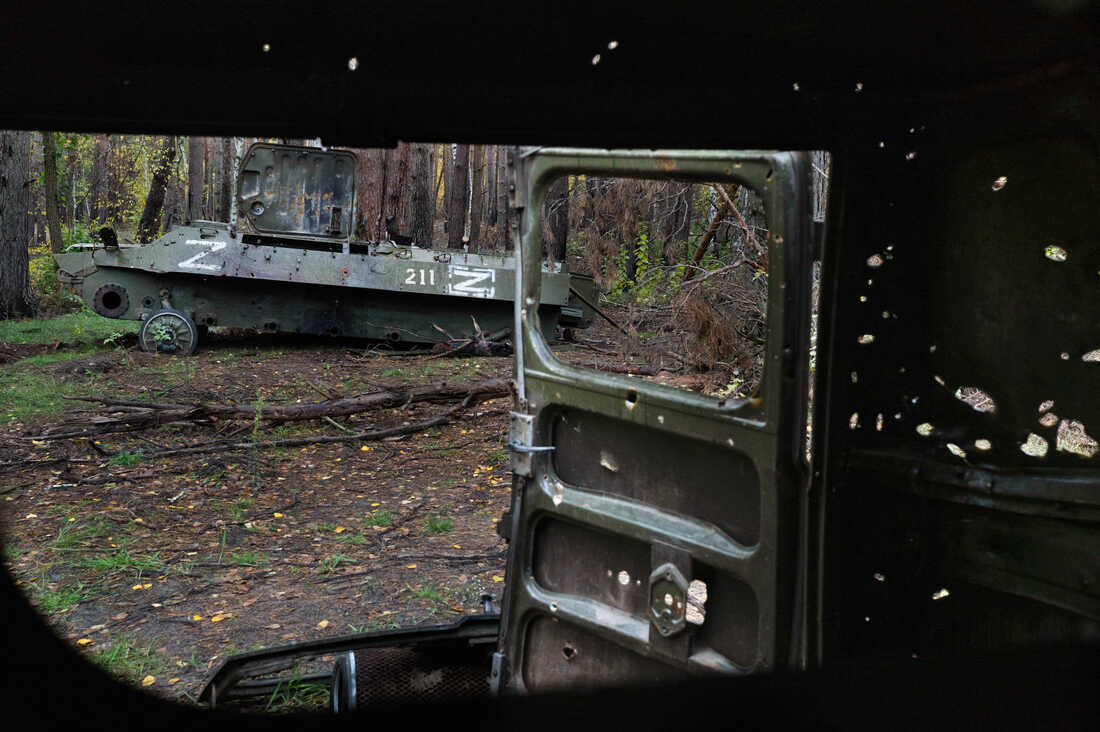
Abandonded autos with Russian markings are full of holes within the woods in Izium in October.
Claire Harbage/NPR
conceal caption
toggle caption
Claire Harbage/NPR

Abandonded autos with Russian markings are full of holes within the woods in Izium in October.
Claire Harbage/NPR
As of late October, the power ministry says, Russian assaults have broken about 40% of the nation’s thermal technology. Ninety % of its wind energy and greater than 40% % of its photo voltaic power sources have been both underneath occupation or broken.
Many of Russia’s newer assaults have focused the distribution programs, says DTEK, Ukraine’s largest personal energy generator.
“These actions cannot be called anything other than energy terrorism and a brutal attempt to create a humanitarian disaster right in the center of Europe,” DTEK says in a press release.
Attacks on substations and transformers restrict Ukraine’s means to maneuver energy round and likewise its means to import power from Europe. They’re additionally more durable targets to defend towards long-range assaults, says Oleksandr Kharchenko, the director of the Energy Research Center in Kyiv.
“I believe that Ukraine has enough [electrical] generation capacity,” says Kharchenko. “Generation capacity has been better defended from the start of this war. But substations — there are a lot of them. It’s not possible to cover each of them by special air defense [systems].”
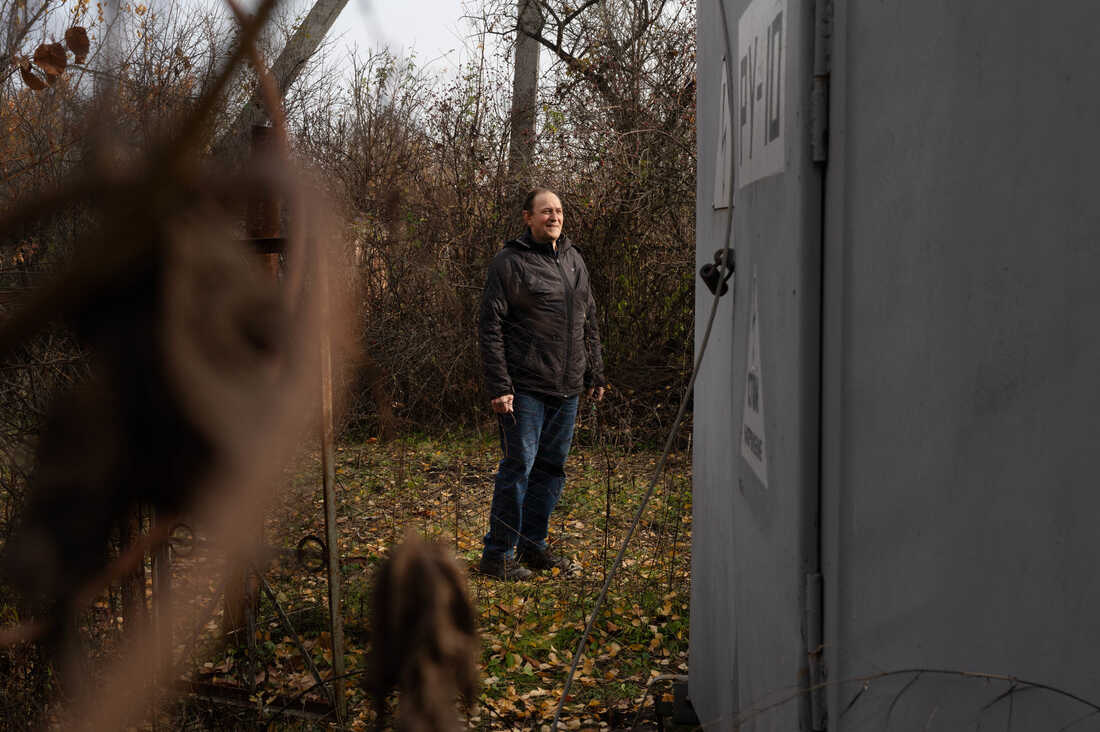
Mykhailo Voinov, an electrician who’s been fixing broken Ukrainian power infrastructure, appears to be like at a broken electrical substation in northeast Ukraine’s Kharkiv area.
Claire Harbage/NPR
conceal caption
toggle caption
Claire Harbage/NPR

Mykhailo Voinov, an electrician who’s been fixing broken Ukrainian power infrastructure, appears to be like at a broken electrical substation in northeast Ukraine’s Kharkiv area.
Claire Harbage/NPR
Ukraine races to restore its electrical grid
In a small village east of Kharkiv, the place the sounds of artillery and tanks can nonetheless be heard like distant thunder, Mykhailo Voinov opens the steel door of a broken electrical substation. A thumb-sized gash, from shrapnel, mars the door.
Voinov is an electrician who’s been fixing broken Ukrainian power infrastructure.
“There’s a lot of damage from shrapnel, but this one is the worst,” he says, reaching into the substation and tapping on its predominant element, a ribbed cylinder-shaped transformer. It’s empty, he factors out. The oil from it drained via a gap from the shrapnel.

Voinov closes the gate to {an electrical} substation after wanting on the harm.
Claire Harbage/NPR
conceal caption
toggle caption
Claire Harbage/NPR

Voinov closes the gate to {an electrical} substation after wanting on the harm.
Claire Harbage/NPR
Fixing this one substation will price 1000’s of {dollars}, Voinov says. Transformers, conductors and different elements for electrical substations are briefly provide. His group usually has to attend weeks for tools earlier than they will make repairs, he says.
“Repair crews are working 24/7, without a day off, to minimize the length of emergency power outages,” Ukraine’s power ministry says. Still, authorities are urging residents to preserve electrical energy, as a lot of the inhabitants prepares for a protracted winter with common outages.
Voinov is amongst them. In a small village the place his household owns a dacha, a summer time cottage, energy is predicted to be out for months. Only a number of residents, together with Oleksandr Lysytskyi and his spouse, Svitalana Maliarova, stay.
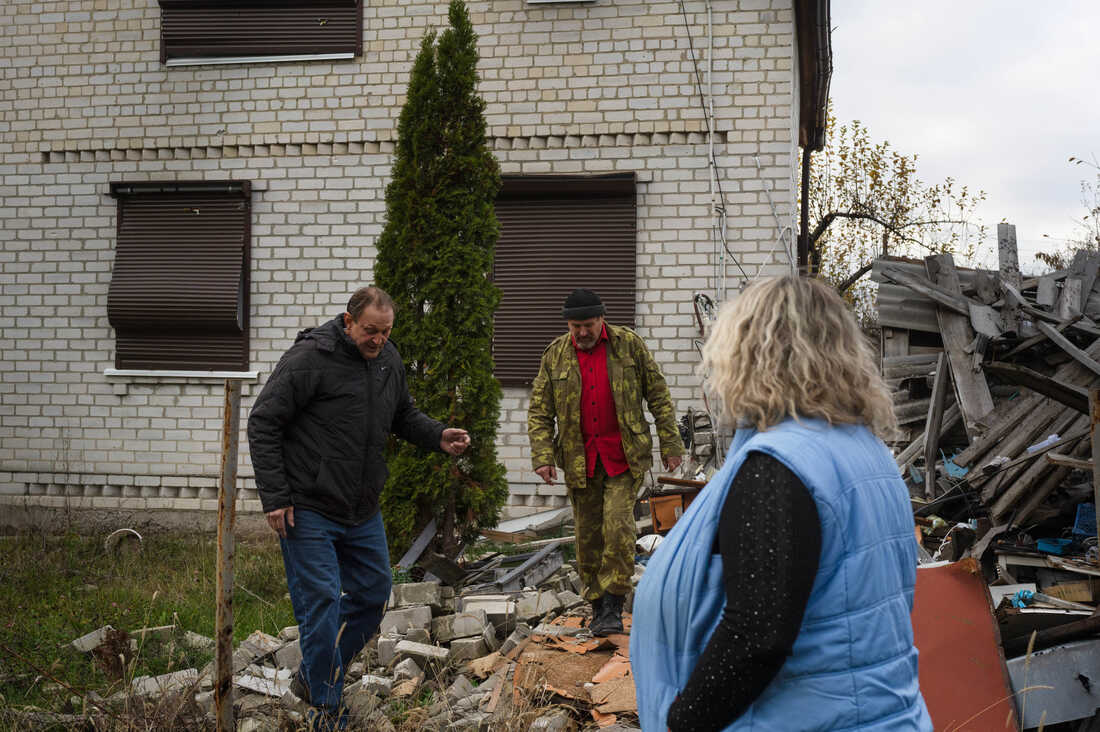
Voinov with Oleksandr Lysytskyi and his spouse, Svitalana Maliarova, have a look at rubble of their neighborhood. They are a few of the few residents staying of their village the place energy is predicted to be out for months.
Claire Harbage/NPR
conceal caption
toggle caption
Claire Harbage/NPR

Voinov with Oleksandr Lysytskyi and his spouse, Svitalana Maliarova, have a look at rubble of their neighborhood. They are a few of the few residents staying of their village the place energy is predicted to be out for months.
Claire Harbage/NPR
A crater from a Russian artillery shell that landed of their yard is full of damaged glass. They buried certainly one of their canines in one other, Lysytskyi says.
Since Russian troops have been pushed out of the world in mid-September, Lysytskyi says, he is been making an attempt to arrange his home for the approaching winter. They’re boarding up damaged home windows with plywood or masking them with plastic sheets supplied by the United Nations.
A wood-fire boiler gives his residence with warmth. The wooden, he says quietly, he is been accumulating from the mine-riddled woods behind their home.
Lysytskyi and his household remained on this small village all through Russia’s occupation. They’ll keep, he says, via the approaching winter.

Candles sit on the desk in Voinov’s residence. With the facility out, he and different residents stay by wooden warmth and candle gentle.
Claire Harbage/NPR
conceal caption
toggle caption
Claire Harbage/NPR

Candles sit on the desk in Voinov’s residence. With the facility out, he and different residents stay by wooden warmth and candle gentle.
Claire Harbage/NPR
Millions of Ukrainians are anticipated to show to firewood to warmth their properties
Wood-burning stoves and boilers, like the sort Lysytskyi is relying on, have been in excessive demand throughout Ukraine. They’re now so exhausting to purchase that territorial protection models have taken to creating stoves by welding sheets of steel, for troopers who will spend the winter in front-line positions.
The elevated reliance on firewood has raised issues from some environmental teams in Ukraine. Deforestation of the nation’s wealthy woodlands was a concern even earlier than Russia’s full-scale invasion. Last yr, Ukrainian President Volodymyr Zelenskyy launched a Green Country Project, geared toward reforesting components of the nation with 1,000,000 timber.

A person carries wooden out of an space west of Izium that was considerably broken underneath Russian occupation. While unpermitted logging is punishable by fines, individuals nonetheless want the wooden.
Claire Harbage/NPR
conceal caption
toggle caption
Claire Harbage/NPR

A person carries wooden out of an space west of Izium that was considerably broken underneath Russian occupation. While unpermitted logging is punishable by fines, individuals nonetheless want the wooden.
Claire Harbage/NPR
Since Russia’s invasion, Ukraine’s atmosphere ministry has despatched warnings to the general public, making it clear that unpermitted logging is punishable by fines.
The want to guard undamaged forests is paramount, says Ruslan Strilets, the atmosphere minister. “Because of the trenches, the explosions and fires,” he says. “One-third of Ukrainian woodland has been damaged by war.”
Strilets believes unlawful logging will not be a serious subject for the nation over the winter — partly as a result of the federal government has expanded a program to offer civilians with firewood to satisfy elevated demand.
The state-run program offers residents the chance to purchase as much as roughly 530 cubic ft of firewood for the upcoming heating season. The authorities has greater than doubled the quantity of wooden accessible for buy, Strilets says, in anticipation of the elevated want.

A state-run forestry operation close to Zhytomyr accumulating firewood for supply to impacted areas.
Claire Harbage/NPR
conceal caption
toggle caption
Claire Harbage/NPR
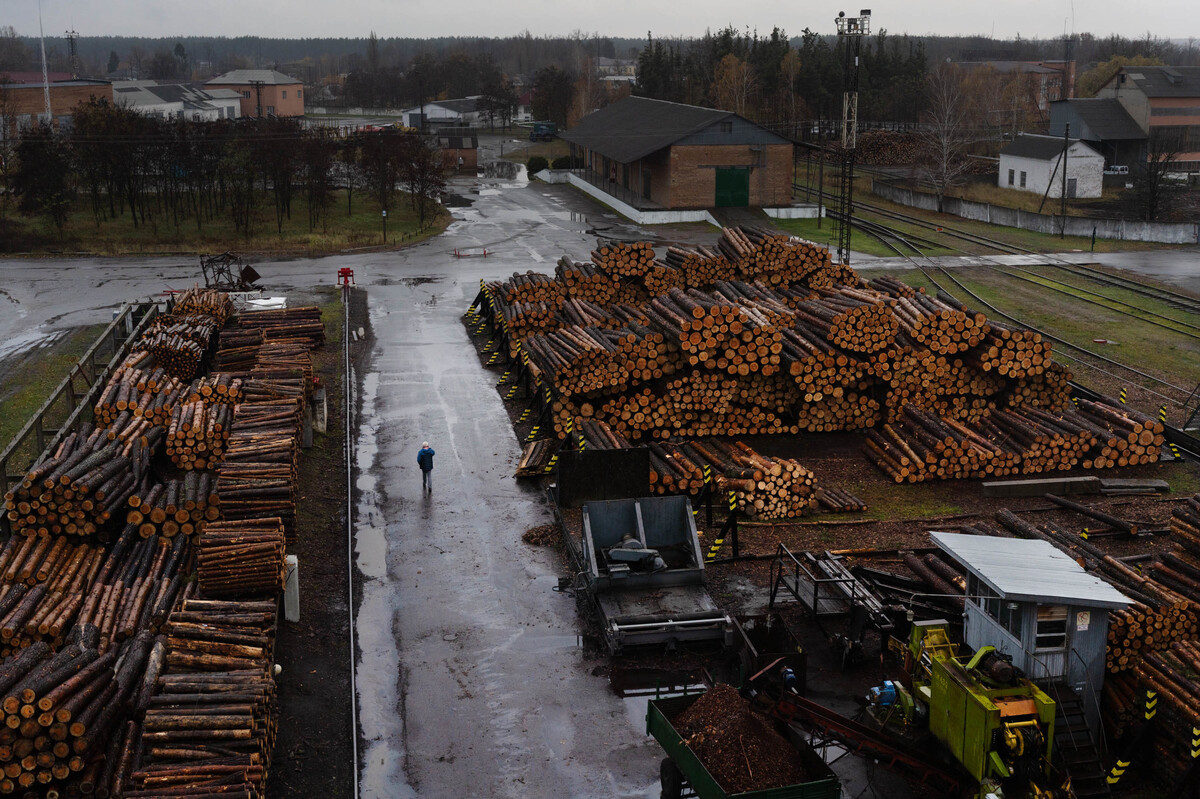
A state-run forestry operation close to Zhytomyr accumulating firewood for supply to impacted areas.
Claire Harbage/NPR
There are logistical points to beat although. Civilians want to have the ability to afford the firewood — an issue with the elevated price of on a regular basis items, like meals and drugs. There are additionally issues about supply — how firewood will probably be transported to hard-hit locations like Izium.
Bridges, roads and railways have been broken throughout Ukraine and many individuals aren’t ready to navigate the bureaucratic means of getting wooden bought and delivered, says a resident of Izium, in far northeastern Ukraine. He prefers to not give his title as a result of he is been illegally accumulating wooden for neighbors.

A broken woodland space that the Russians used as an ammunition storage web site west of Izium, earlier than they have been pushed out.
Claire Harbage/NPR
conceal caption
toggle caption
Claire Harbage/NPR

A broken woodland space that the Russians used as an ammunition storage web site west of Izium, earlier than they have been pushed out.
Claire Harbage/NPR
The man, a author earlier than the conflict, has been organizing different males to produce residents of the closely broken city with firewood. He’s been accumulating it in a burnt and torn woodland that the Russians had been utilizing, earlier than being pushed out, as an ammunition storage web site west of city.
“These trees will be cut down,” he says, standing amongst spent Russian artillery shells. “The government will hire people and pay for this, but so far they haven’t decided what to do and we have the chance to cut this wood for people who need it, and take it to them.”

Logging within the lately liberated areas West of Izium is harmful and punishable by fines. Unexploded ordnance litters the bottom. But some loggers take the chance for the chance to reap and ship the wooden to individuals who want warmth.
Claire Harbage/NPR
conceal caption
toggle caption
Claire Harbage/NPR
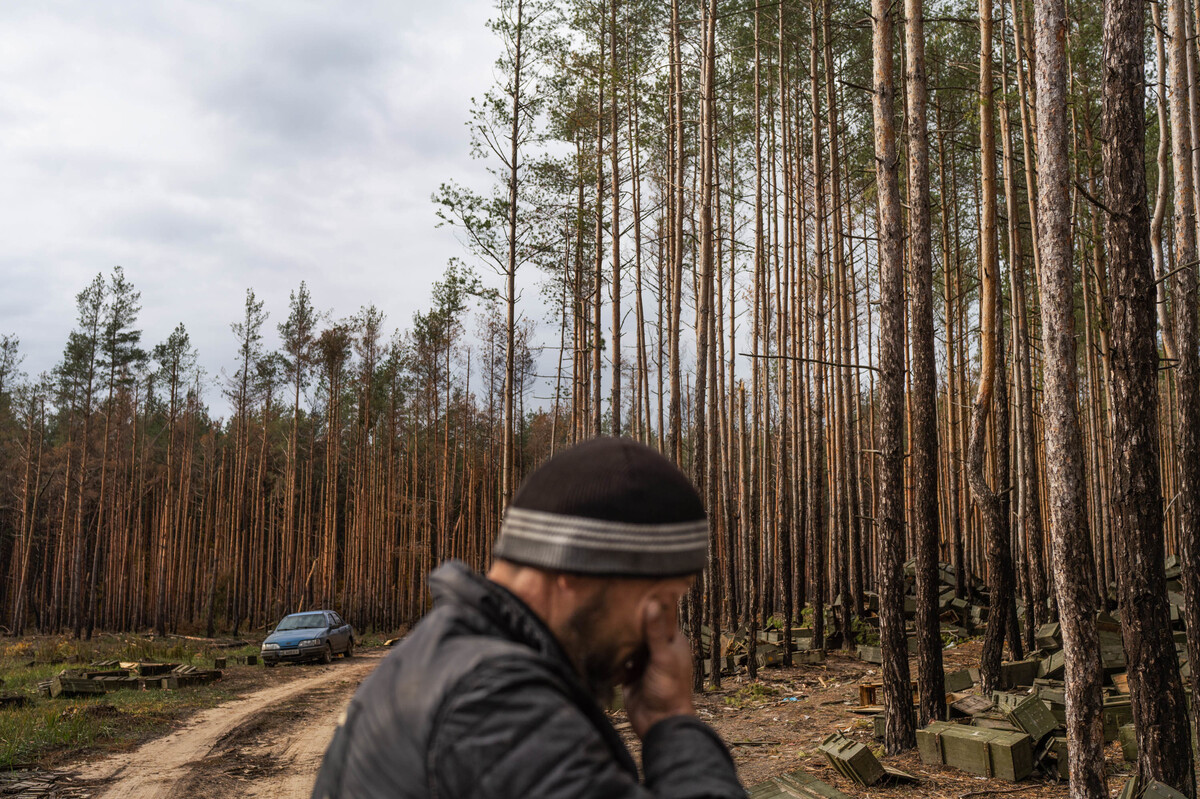
Logging within the lately liberated areas West of Izium is harmful and punishable by fines. Unexploded ordnance litters the bottom. But some loggers take the chance for the chance to reap and ship the wooden to individuals who want warmth.
Claire Harbage/NPR
The work is harmful. Unexploded ordnance litters the bottom. Jagged steel is buried within the gentle grime. A neighborhood official tells NPR it’ll take years to demine the woodland, the place residents like the person logging used to gather mushrooms.
Asked if he is apprehensive about being fined or stepping on an explosive, the logger laughs.
“I think freezing temperatures are scarier than forestry.”
[adinserter block=”4″]
[ad_2]
Source link